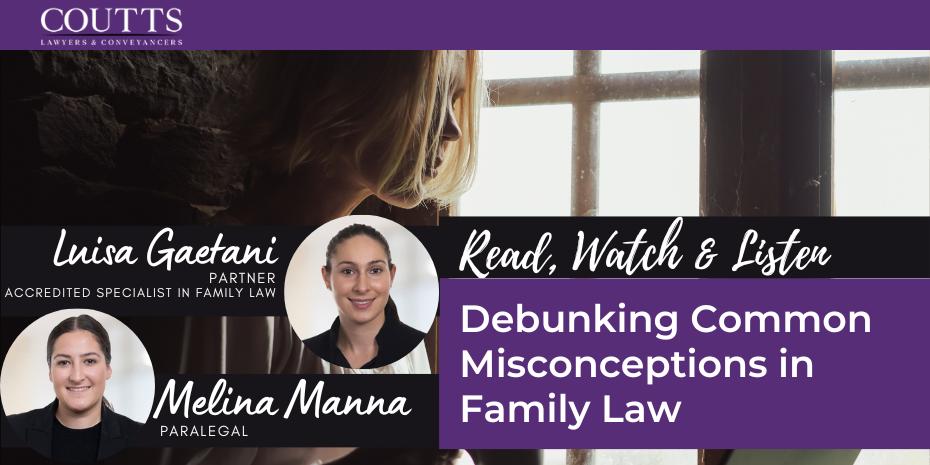Co-authored by Amy Duguid
KEY TAKE-OUTS:
- Real estate is often the biggest asset to split following a separation, so it’s important it is dealt with fairly.
- Even if amicable, it is important to obtain independent legal advice and ensure the split is formalised.
Real Estate is one of our clients’ biggest assets, which is why it is extremely important to get it right when selling your property, especially when the owner/s are selling due to a separation.
We are both on title and agree to sell the property – why would we need legal advice?
Quite often we hear “We are both amicable and we agree to split the sale proceeds equally”. Whilst it is great that you are amicable, this doesn’t always remain the case, particularly when there is a lot of money at stake. Under the Family Law Act 1975 (Cth), there are a range of factors to be considered when determining what split of the property pool would be considered fair and equitable. Financial contributions, such as who paid the mortgage, are only one factor. Other factors such as who made the majority of the homemaker contributions, or who was the main caretaker of the children, are also considered. No two families are the same, and no two separations are the same. It is imperative that at least one of you obtains independent legal advice as to what the Court would consider to be a fair and equitable split of the property pool in the circumstances.
We have reached an agreement – what happens next?
Where agreement is reached between the parties, it is important that the agreement is formalised in a legally binding agreement, such as consent orders or a Binding Financial Agreement. This is an important step to sever the financial relationship between you, and to ensure that no further claims can be made. This not only protects the proceeds of the property you are selling, it also ensures that any future property purchased, or inheritance or windfall (such as a lotto win) is not subject to Family Law proceedings in the future.
What happens to the sale proceeds?
In the event that Consent Orders have been sealed by the Court, and the property ordered to be sold, the sale proceeds will be distributed in accordance with the Orders. Any percentage split of the proceeds is usually calculated after any discharge of mortgage is paid, real estate commission, legal fees, rates, levies and anything else relating to the property. There may also be a clause in the orders for either or both of the parties’ debt, such as a personal loan or credit card, to be paid from the proceeds.
Can I sell property during separation if property orders have not been finalised?
If the property is in both the separating owners’ names and both owners are agreeable to the property being sold, the answer is yes. In the case of the Orders not being finalised, the sale proceeds (after the debts and amounts owing in relation to the sale of the property have been paid) are usually then held in the Trust Account of your Lawyer until Orders have been sealed by the Court, or until both parties instruct otherwise.
Can I sell property without my former partner’s consent if they are not on title?
Yes, you can, however, the other party is entitled to apply for an injunction preventing the sale of the home where they have an equitable interest. Further, where the property is likely to be involved in family law proceedings, the proceeds of sale would likely be added back into the property pool at a later date. It is recommended that you obtain independent legal advice from a Family Lawyer prior to placing the property on the market.
How do you sell property if one partner refuses despite sealed Court orders?
In most cases, it is possible to apply to the Court for a Judicial Registrar to act on behalf of a party who refuses or fails to do so. Section 106A of the Family Law Act 1975 provides that the court may appoint an officer of the court or other person to execute the deed or instrument in the name of the person to whom the direction was given and to do all acts and things necessary to give validity and operation to the deed or instrument if that person has refused or neglected to comply.
Can separating couples use the same Lawyer to finalise orders?
No. Lawyers are unable to act for both parties in family law proceedings. It is often the case that parties are amicable when first separating. However, there are many circumstances where the interests of each party may conflict, and the parties may not always agree. Lawyers are bound by legislation to act in the best interests of their client, and to avoid any conflicts of interest. It is very common for the best interests of separated couples to be different, which would result in a conflict of interest. However, if both parties are fairly amicable and in agreement, both parties do not necessarily need to instruct Lawyers. It is recommended that both parties obtain independent legal advice, however it is not essential.
Can I use the deposit from the joint sale towards purchasing another property?
It is often the case that parties are amicable when first separating. However, there are many circumstances where the interests of each party may conflict, and the parties may not always agree. Lawyers are bound by legislation to act in the best interests of their client, and to avoid any conflicts of interest. It is very common for the best interests of separated couples to be different, which would result in a conflict of interest. However, if both parties are fairly amicable and in agreement, both parties do not necessarily need to instruct Lawyers. It is recommended that both parties obtain independent legal advice, however it is not essential.
There are many factors to consider here. From a Conveyancing perspective, the Contract for Sale of Land usually includes a special condition which states that the deposit, held by the real estate agent, (whether it be part of or all of) may or may not be released prior to settlement. This special condition usually specifies that the deposit can only be released to pay a deposit on the purchase of a property, for the payment of stamp duty on a property they are purchasing or for any other reason that the Vendor may request.
It is therefore important to check the Contract for Sale in the first instance to ensure that this is possible. From a Family Law perspective, if both parties consent to the release of the deposit, and the Consent Orders are not yet drafted, this will need to be catered for in the Consent Orders. If this request has occurred after the making of the Consent Orders, an adjustment will need to be made to the settlement figures prior to the distribution of the sale proceeds.
However, if both parties don’t consent, it is unlikely that a Court would make such an Order. This also involves risk to both parties, particularly in circumstances where one party is purchasing a property prior to finalising the property settlement, and we would recommend that you obtain independent legal advice catered to your specific circumstances before agreeing to release part of the deposit.
We are here to help
Ensure a fair property split during separation. Get independent legal advice to formalise agreements and protect your interests. Contact Coutts Lawyers & Conveyancers for expert assistance in selling property after a separation.
ABOUT AMY DUGUID:

Amy joined the Coutts Lawyers and Conveyancers team in 2020 as a Licensed Conveyancer and Justice of the Peace in our Camden office. She was born in Camden and has been based in Camden most of her working life, therefore has created strong personal and working relationships in the local community and enjoys giving back to her hometown.
Amy brings 20 years of conveyancing experience to Coutts and is dedicated to guiding her clients throughout the selling and buying process.
For further information please don’t hesitate to contact:
Amy Duguid
Licensed Conveyancer & JP
info@couttslegal.com.au
1300 268 887
Contact Coutt Lawyers & Conveyancers today.
This blog is merely general and non specific information on the subject matter and is not and should not be considered or relied on as legal advice. Coutts is not responsible for any cost, expense, loss or liability whatsoever in relation to this blog, including all or any reliance on this blog or use or application of this blog by you.



